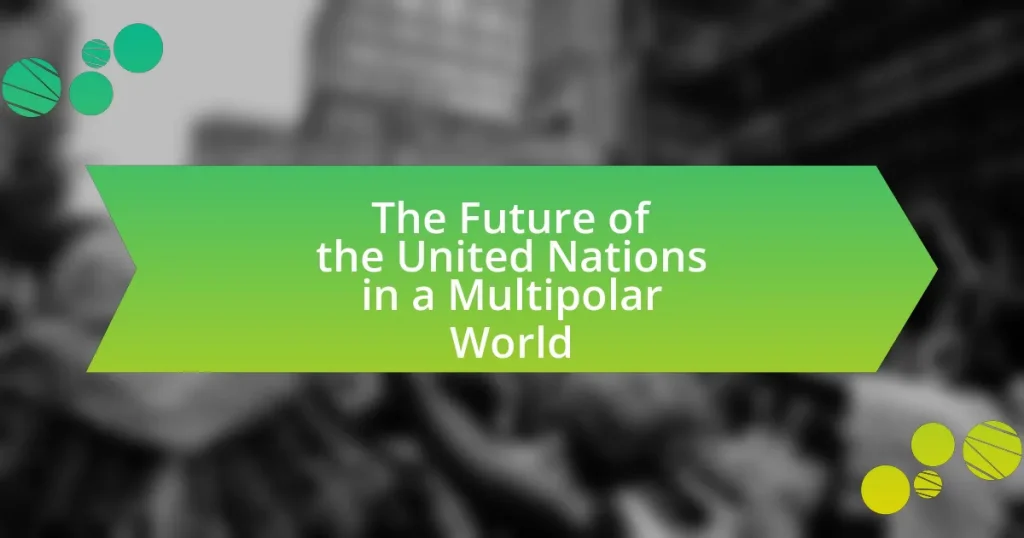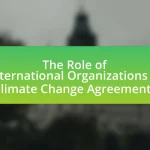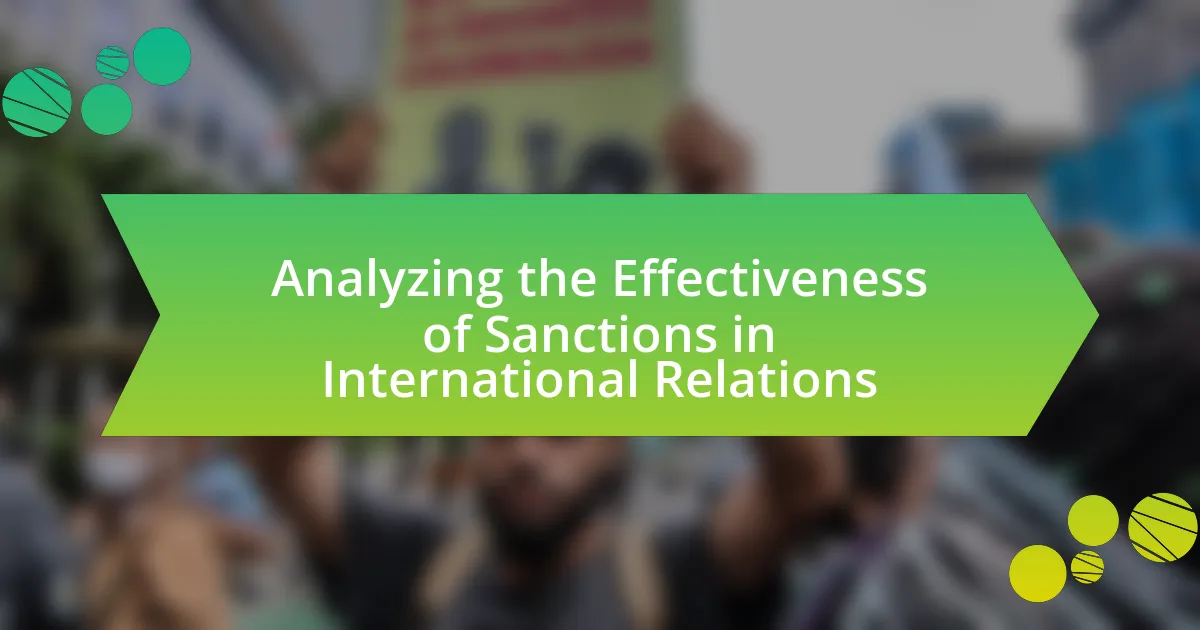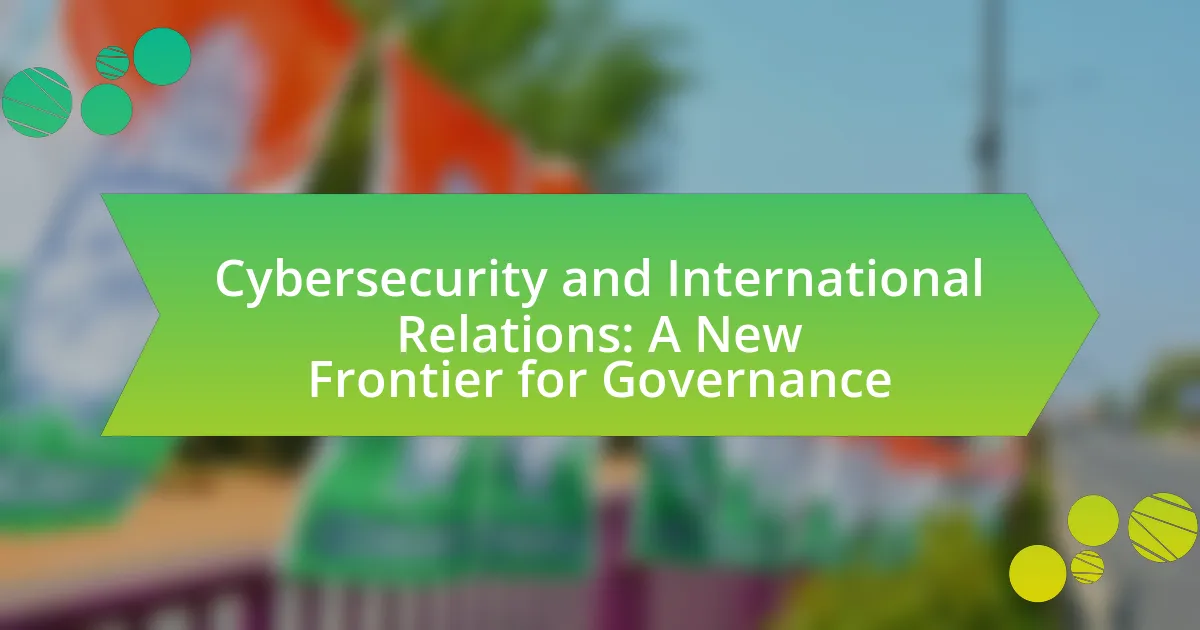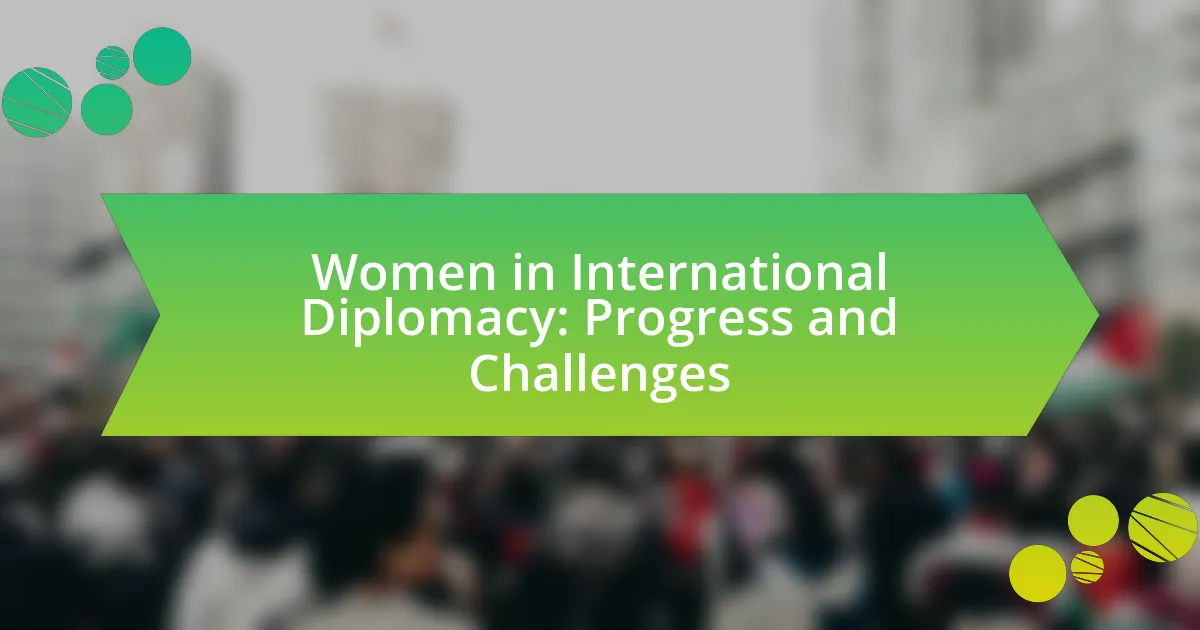The article examines the future of the United Nations (UN) in a multipolar world, where multiple nations and power centers hold significant influence. It discusses the need for the UN to adapt its structure and functions to remain relevant amidst the rising prominence of countries like China and India, as well as regional blocs. Key topics include the definition and characteristics of a multipolar world, the challenges the UN faces in achieving consensus among diverse global powers, and the opportunities for enhancing global governance through inclusive dialogue and partnerships. The article also highlights necessary reforms for the UN, the role of emerging powers, and strategies for leveraging technology to improve operations and decision-making processes.
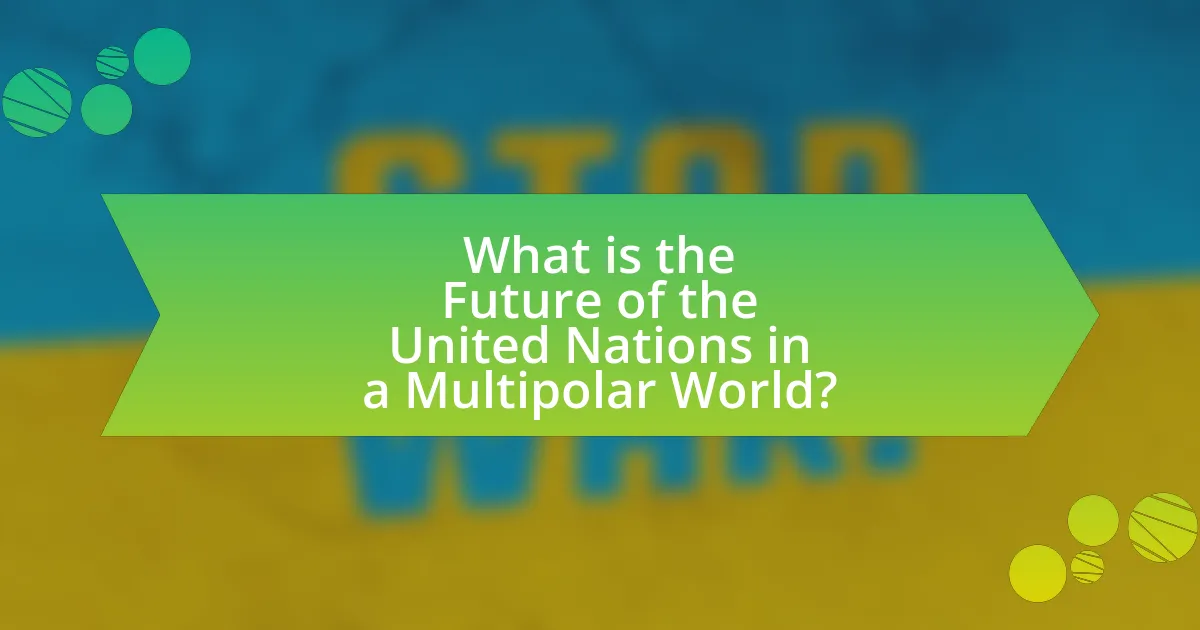
What is the Future of the United Nations in a Multipolar World?
The future of the United Nations in a multipolar world involves adapting its structure and functions to accommodate the increasing influence of multiple global powers. As nations like China, India, and regional blocs gain prominence, the UN must enhance its role in facilitating dialogue and cooperation among diverse stakeholders. This adaptation is essential to maintain its relevance and effectiveness in addressing global challenges such as climate change, security threats, and humanitarian crises. Historical precedents, such as the UN’s response to the rise of the European Union and the G20, illustrate its capacity to evolve in response to shifting power dynamics.
How is the concept of a multipolar world defined?
The concept of a multipolar world is defined as a global system in which multiple nations or power centers hold significant influence, rather than a single dominant power. This framework suggests that international relations are characterized by the presence of several influential states, each with its own interests and capabilities, leading to a more balanced distribution of power. Historical context supports this definition, as the post-Cold War era has seen the rise of emerging economies like China and India, which challenge the previously unipolar dominance of the United States, thereby illustrating the dynamics of a multipolar world.
What are the key characteristics of a multipolar world?
A multipolar world is characterized by the presence of multiple influential states or power centers that shape global politics and economics. In this system, no single nation dominates; instead, power is distributed among various countries, leading to a balance that encourages cooperation and competition. For instance, the rise of countries like China, India, and the European Union alongside traditional powers such as the United States illustrates this distribution of influence. This dynamic fosters a more complex international landscape where alliances and partnerships are fluid, and global governance requires negotiation among diverse actors.
How does a multipolar world differ from a unipolar or bipolar world?
A multipolar world is characterized by multiple influential powers, contrasting with a unipolar world dominated by a single superpower and a bipolar world where two powers hold significant influence. In a multipolar world, global governance and decision-making are more decentralized, allowing for diverse perspectives and interests to shape international relations. For instance, the rise of countries like China, India, and the European Union alongside the United States illustrates this shift, as these entities engage in complex interdependencies and collaborations, unlike the clear dominance seen in unipolarity or the rivalry in bipolarity. This dynamic fosters a more collaborative approach to global challenges, as seen in multilateral organizations like the United Nations, which must adapt to accommodate the interests of various states rather than being primarily influenced by one or two dominant nations.
What challenges does the United Nations face in a multipolar world?
The United Nations faces significant challenges in a multipolar world, primarily due to the increasing influence of multiple global powers that often have conflicting interests. This shift complicates consensus-building, as nations like the United States, China, and Russia pursue divergent agendas, leading to gridlock in decision-making processes. For instance, the UN Security Council has experienced stalemates on critical issues such as Syria and Ukraine, where vetoes from permanent members reflect the competing geopolitical interests. Additionally, the rise of regional powers can undermine the authority of the UN, as these nations may prioritize their own agendas over collective action, further challenging the organization’s effectiveness in addressing global issues like climate change and humanitarian crises.
How do geopolitical tensions impact the UN’s effectiveness?
Geopolitical tensions significantly undermine the UN’s effectiveness by creating divisions among member states, which hampers consensus-building and decision-making processes. For instance, during the Syrian civil war, geopolitical rivalries led to a deadlock in the UN Security Council, preventing timely humanitarian interventions and resolutions. Additionally, the ongoing tensions between major powers, such as the United States and Russia, often result in vetoes that block critical actions, illustrating how conflicting national interests can paralyze the UN’s ability to respond to global crises.
What role do emerging powers play in shaping the UN’s future?
Emerging powers play a crucial role in shaping the UN’s future by influencing its policies and decision-making processes. Countries like India, Brazil, and South Africa are increasingly asserting their interests within the UN framework, advocating for reforms that reflect the realities of a multipolar world. For instance, the G20, which includes many emerging economies, has become a significant platform for addressing global issues, thereby impacting UN agendas. Additionally, these nations often push for greater representation in the Security Council, highlighting the need for a more equitable global governance structure. Their participation in peacekeeping missions and climate negotiations further demonstrates their commitment to multilateralism, which is essential for the UN’s relevance in addressing contemporary global challenges.
What opportunities exist for the United Nations in a multipolar world?
The United Nations has the opportunity to enhance global governance and cooperation in a multipolar world by facilitating dialogue among diverse power centers. This environment allows the UN to act as a mediator in conflicts, leveraging its unique position to promote peace and security through multilateral agreements. For instance, the rise of emerging economies can lead to new partnerships that strengthen the UN’s role in addressing global challenges such as climate change and health crises. Additionally, the UN can harness the varied perspectives of multiple nations to foster inclusive decision-making processes, thereby increasing its legitimacy and effectiveness in international affairs.
How can the UN leverage diverse perspectives for global governance?
The UN can leverage diverse perspectives for global governance by actively engaging member states, civil society, and various stakeholders in decision-making processes. This engagement fosters inclusivity and ensures that policies reflect a wide range of cultural, social, and economic contexts. For instance, the UN’s Sustainable Development Goals (SDGs) were developed through extensive consultations with diverse groups, highlighting the importance of incorporating different viewpoints to address global challenges effectively. By utilizing platforms such as the UN General Assembly and specialized agencies, the UN can facilitate dialogue that incorporates these varied perspectives, ultimately leading to more comprehensive and effective governance solutions.
What initiatives can the UN pursue to enhance its relevance?
The UN can enhance its relevance by prioritizing climate action and sustainable development initiatives. By aligning its goals with the Paris Agreement and the Sustainable Development Goals (SDGs), the UN can address pressing global challenges such as climate change, poverty, and inequality. For instance, the UN’s Climate Action Summit in 2019 mobilized commitments from countries and organizations to reduce greenhouse gas emissions, demonstrating its role in fostering international cooperation. Additionally, the UN can strengthen partnerships with regional organizations and civil society to ensure inclusive decision-making processes, thereby reflecting the diverse interests of a multipolar world. This approach not only reinforces the UN’s legitimacy but also enhances its capacity to respond effectively to global issues.
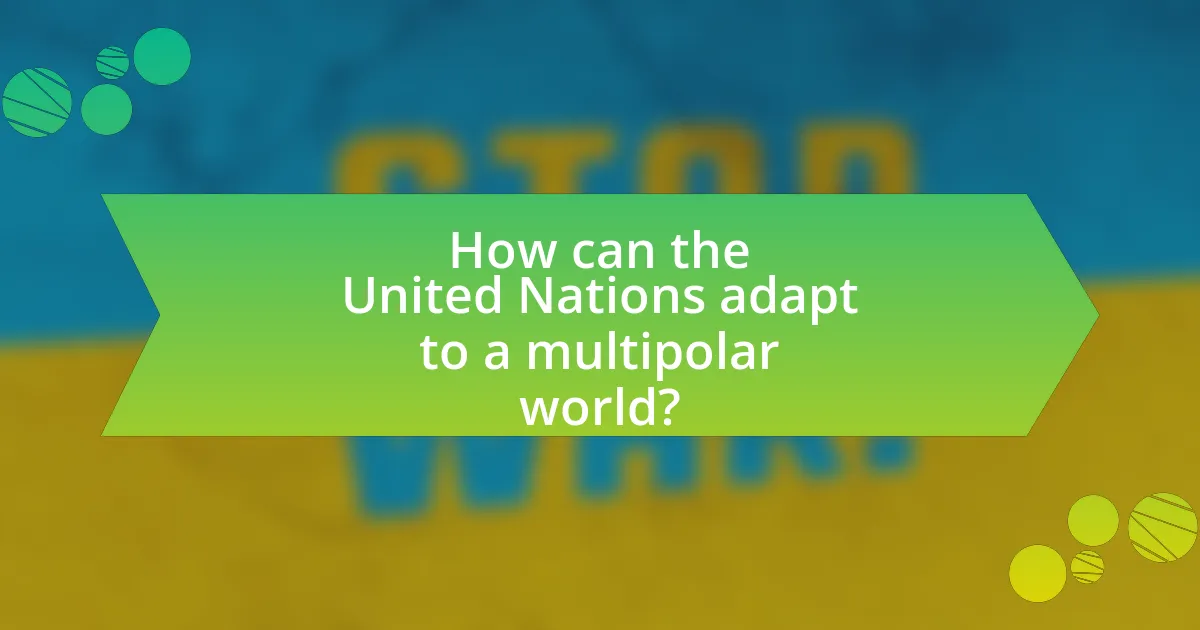
How can the United Nations adapt to a multipolar world?
The United Nations can adapt to a multipolar world by reforming its governance structures to better reflect the diverse power dynamics among member states. This includes expanding the Security Council to include emerging powers, thereby ensuring that decisions represent a broader range of interests and perspectives. Historical context shows that the current structure, dominated by five permanent members, does not adequately address the realities of global power shifts, as evidenced by the rise of countries like India and Brazil. Additionally, the UN can enhance its role in multilateral diplomacy by facilitating dialogue among various global actors, including regional organizations and non-state entities, to foster collaborative solutions to global challenges. This approach aligns with the UN’s founding principles of collective security and international cooperation, ensuring its relevance in a changing geopolitical landscape.
What reforms are necessary for the UN to remain effective?
The United Nations requires reforms in its governance structure, funding mechanisms, and decision-making processes to remain effective. Specifically, expanding the Security Council to include emerging powers like India and Brazil would enhance its legitimacy and reflect current geopolitical realities. Additionally, increasing the UN’s budgetary flexibility and ensuring more equitable contributions from member states can improve operational efficiency. Evidence from the 2021 UN report on global governance highlights that a more representative Security Council could lead to better conflict resolution and international cooperation.
How can the UN improve its decision-making processes?
The UN can improve its decision-making processes by enhancing transparency and inclusivity in its operations. Implementing a more participatory approach that involves a broader range of stakeholders, including civil society and non-governmental organizations, can lead to more informed and representative decisions. For instance, the UN’s adoption of the 2030 Agenda for Sustainable Development emphasized stakeholder engagement, which has shown to foster collaboration and accountability. Additionally, utilizing data-driven decision-making tools can streamline processes and improve outcomes, as evidenced by the UN’s use of big data analytics in humanitarian responses, which has increased efficiency and effectiveness in crisis situations.
What changes are needed in the UN’s structure to reflect a multipolar reality?
To reflect a multipolar reality, the UN’s structure needs to incorporate a more equitable representation of emerging powers in decision-making processes. This can be achieved by reforming the Security Council to include permanent seats for countries such as India, Brazil, and South Africa, which are significant players in global politics. Historical context shows that the current structure, established post-World War II, does not adequately represent the geopolitical landscape of the 21st century, where power is increasingly distributed among multiple nations rather than dominated by a few. Additionally, enhancing the role of regional organizations in the UN framework can facilitate a more inclusive approach to global governance, aligning with the interests of diverse member states.
How can the UN engage with non-state actors in a multipolar world?
The UN can engage with non-state actors in a multipolar world by establishing formal partnerships and collaborative frameworks that recognize their influence and contributions. This engagement can include creating platforms for dialogue, facilitating joint initiatives on global issues such as climate change and human rights, and integrating non-state actors into decision-making processes. For instance, the UN has previously collaborated with civil society organizations and the private sector through initiatives like the Global Compact, which encourages businesses to adopt sustainable practices. Such partnerships enhance the UN’s ability to address complex global challenges by leveraging the expertise and resources of diverse stakeholders.
What role do NGOs and civil society play in UN initiatives?
NGOs and civil society play a crucial role in UN initiatives by providing expertise, advocacy, and grassroots perspectives that enhance the effectiveness of UN programs. They contribute to policy formulation, implementation, and monitoring by representing diverse voices and interests, which helps ensure that the needs of marginalized populations are addressed. For instance, during the UN Sustainable Development Goals (SDGs) process, NGOs were instrumental in shaping the agenda by advocating for inclusivity and sustainability, demonstrating their influence in global governance. Their participation not only enriches discussions but also fosters accountability and transparency within UN operations, as evidenced by the increasing collaboration between the UN and civil society organizations in various humanitarian and development efforts.
How can the UN foster partnerships with the private sector?
The UN can foster partnerships with the private sector by creating collaborative frameworks that align business goals with sustainable development objectives. These frameworks can include initiatives like the UN Global Compact, which encourages companies to adopt sustainable and socially responsible policies. By facilitating dialogue between member states and private enterprises, the UN can leverage private sector innovation and resources to address global challenges such as climate change and poverty. For instance, partnerships with companies in renewable energy can accelerate the transition to sustainable energy sources, directly supporting the UN’s Sustainable Development Goals.
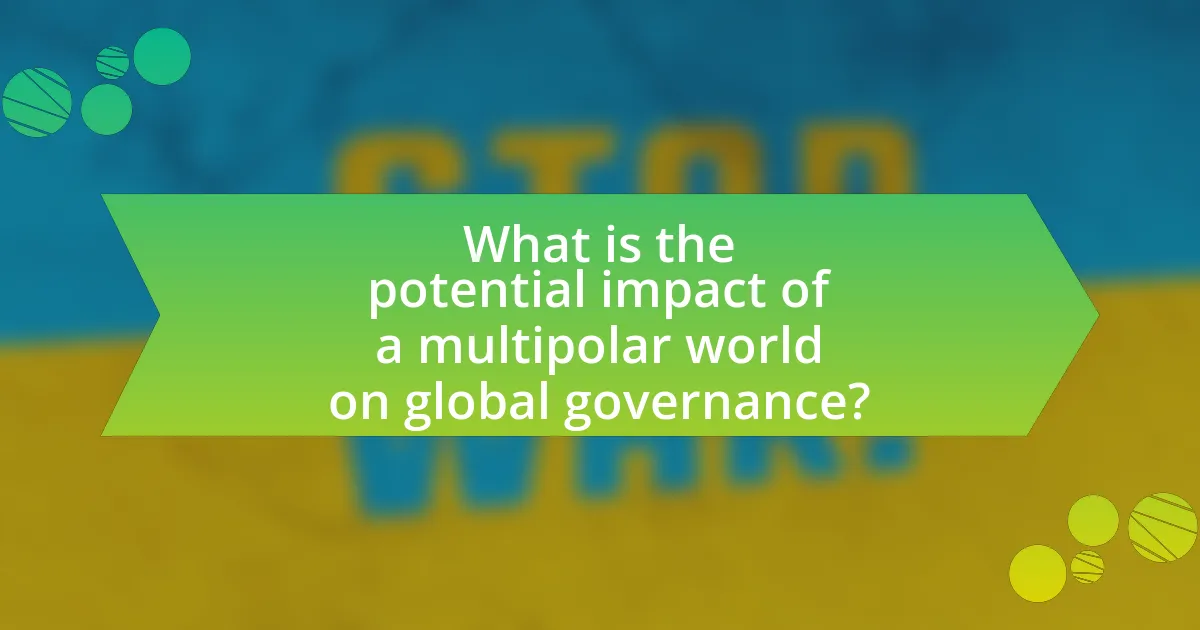
What is the potential impact of a multipolar world on global governance?
A multipolar world can significantly alter global governance by redistributing power among multiple states, leading to a more complex and fragmented international system. In this scenario, no single nation dominates, which can enhance the representation of diverse interests in global decision-making processes. For instance, the rise of emerging economies like India and Brazil has already begun to challenge the traditional dominance of Western powers in institutions such as the United Nations, potentially leading to reforms that reflect a broader range of perspectives. This shift may result in increased competition and negotiation among states, as well as the emergence of new coalitions and alliances, which can complicate consensus-building efforts. Additionally, the multipolarity may foster regional governance structures, as countries seek to address local issues more effectively, thereby impacting the overall efficacy of global governance frameworks.
How does a multipolar world influence international law and norms?
A multipolar world influences international law and norms by increasing the complexity and diversity of legal frameworks and standards. In such a world, multiple states and non-state actors assert their interests, leading to a fragmentation of international norms as different powers promote varying legal principles that reflect their geopolitical priorities. For instance, the rise of China and India has introduced alternative perspectives on issues like human rights and trade, challenging the Western-centric legal norms established post-World War II. This shift is evident in the growing influence of regional organizations, such as the Shanghai Cooperation Organization, which prioritize member states’ sovereignty over universal human rights standards. Consequently, the evolution of international law becomes more dynamic and contested, as states navigate competing legal interpretations and norms shaped by their unique geopolitical contexts.
What challenges arise in enforcing international agreements?
Enforcing international agreements faces significant challenges, primarily due to issues of state sovereignty, differing national interests, and lack of enforcement mechanisms. State sovereignty often leads countries to prioritize their own laws and interests over international commitments, resulting in non-compliance. For instance, the Paris Agreement on climate change has seen various nations, such as the United States, withdraw or fail to meet their targets, highlighting the difficulty in holding states accountable. Additionally, differing national interests can create conflicts that hinder cooperation; countries may resist agreements that they perceive as detrimental to their economic or political goals. Lastly, the absence of a centralized authority with the power to enforce compliance means that international agreements often rely on voluntary adherence, which can be inconsistent and unreliable.
How can the UN promote adherence to global norms in a multipolar context?
The UN can promote adherence to global norms in a multipolar context by fostering inclusive dialogue among member states and leveraging its platforms for consensus-building. By facilitating discussions that incorporate diverse perspectives, the UN can help align the interests of various powers, thereby reinforcing commitment to international agreements. Historical examples, such as the Paris Agreement on climate change, demonstrate how multilateral negotiations can lead to widespread adherence when all parties feel represented and engaged. Additionally, the UN can utilize its peacekeeping and monitoring mechanisms to ensure compliance with established norms, thereby enhancing accountability among nations.
What strategies can the UN employ to enhance its global influence?
The UN can enhance its global influence by strengthening multilateral diplomacy and fostering partnerships with regional organizations. By actively engaging in dialogue and collaboration with entities such as the African Union and the European Union, the UN can leverage their regional insights and networks to address global challenges more effectively. For instance, the UN’s partnership with the African Union has been pivotal in peacekeeping efforts in conflict zones like South Sudan, demonstrating how collaborative strategies can amplify the UN’s impact. Additionally, promoting sustainable development goals through targeted initiatives can align member states’ interests with global priorities, thereby increasing the UN’s relevance and authority in international affairs.
How can the UN strengthen its peacekeeping and conflict resolution efforts?
The UN can strengthen its peacekeeping and conflict resolution efforts by enhancing collaboration with regional organizations and increasing the deployment of multidimensional peacekeeping missions. Enhanced collaboration allows for localized knowledge and resources, which can improve the effectiveness of peacekeeping operations. For instance, partnerships with the African Union have led to more tailored responses in conflict zones like South Sudan. Additionally, increasing the number of multidimensional missions, which integrate military, police, and civilian components, has been shown to address the complex needs of post-conflict societies, as evidenced by the success of such missions in places like Liberia and Sierra Leone.
What role does diplomacy play in the UN’s strategy for a multipolar world?
Diplomacy is central to the UN’s strategy for a multipolar world as it facilitates dialogue and cooperation among diverse global powers. The UN employs diplomatic channels to address conflicts, promote peace, and foster collaboration on international issues, ensuring that multiple voices are heard in decision-making processes. For instance, the UN’s mediation efforts in conflicts such as the Syrian civil war demonstrate its commitment to using diplomacy to navigate complex geopolitical landscapes. This approach not only enhances the legitimacy of the UN but also helps maintain stability in a world characterized by shifting power dynamics.
What best practices can the UN adopt for future success?
The UN can adopt best practices such as enhancing multilateral cooperation, prioritizing sustainable development, and leveraging technology for transparency and efficiency. Enhancing multilateral cooperation involves fostering stronger partnerships among member states to address global challenges collectively, as evidenced by the success of the Paris Agreement, which united nations in combating climate change. Prioritizing sustainable development aligns with the UN’s Sustainable Development Goals, which aim to eradicate poverty and promote prosperity while protecting the planet. Leveraging technology for transparency and efficiency can improve accountability and engagement, as seen in initiatives like the UN’s Digital Strategy, which aims to harness digital tools to enhance its operations and outreach. These practices are essential for the UN to remain relevant and effective in a multipolar world.
How can the UN utilize technology to improve its operations?
The UN can utilize technology to improve its operations by implementing advanced data analytics and artificial intelligence to enhance decision-making processes. For instance, the UN can analyze vast amounts of data from various sources to identify trends and predict humanitarian needs, thereby optimizing resource allocation. A specific example is the use of AI in the UN’s World Food Programme, which employs machine learning algorithms to forecast food insecurity and target assistance more effectively. This approach has led to a 20% increase in the efficiency of aid distribution, demonstrating the tangible benefits of integrating technology into UN operations.
What lessons can be learned from past UN initiatives in a multipolar context?
Lessons from past UN initiatives in a multipolar context highlight the importance of inclusivity and adaptability. Historical examples, such as the UN’s response to the Rwandan Genocide in 1994, demonstrate that a lack of consensus among major powers can hinder effective intervention. Additionally, the UN’s peacekeeping missions in the Balkans during the 1990s illustrate the necessity of aligning diverse national interests to achieve sustainable peace. These instances underscore that successful UN initiatives require collaboration among multiple stakeholders, emphasizing the need for a flexible approach that accommodates varying geopolitical dynamics.
